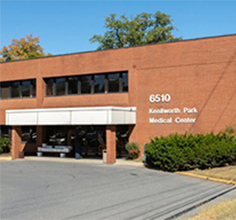
If your nose is running, your head feels heavy, you’re coughing more than usual, and now there’s a fever, it’s hard to know what’s going on. You might think it's a cold, but you also wonder if it’s the flu or COVID. You don’t want to overreact, but you don’t want to ignore something serious, either. People wrestle with this decision all the time, especially during peak illness season. Southern Maryland Medical Group is ready to help. We know how difficult it can be to figure out when to wait it out and when it’s time to see a professional. We’ve broken down the key symptoms to watch, what your body might be trying to tell you, and how primary care doctors can help you get the right care at the right time.
The common cold is usually mild, but it can still be disruptive. Most cases start with a sore throat or stuffy nose. You may feel run down, have a mild cough, and deal with sneezing or watery eyes. Some people get a slight fever, but many don’t. Colds are caused by viruses that infect the upper respiratory tract. There’s no cure, but most colds go away on their own in about a week. Rest, fluids, and over-the-counter remedies can usually keep symptoms manageable. So when should you check in with your doctor? If your cold symptoms linger beyond 10 days, start to worsen instead of improve, or come with intense sinus pain or ear pressure, it’s worth calling your primary care doctor. What seems like a cold can sometimes turn into a sinus infection or bronchitis. Seeing your provider early can help you recover faster and avoid complications.
Flu symptoms come on fast. One day you feel fine, and the next you’re flat in bed with fever, chills, body aches, and exhaustion. A cough and sore throat usually follow. Unlike a cold, the flu affects the entire body, not just the head and nose. Flu season typically hits in late fall and winter. The flu virus spreads quickly, and it can hit vulnerable people especially hard. If you’re pregnant, over 65, have a chronic illness, or care for someone who does, early treatment is very important. Antiviral medications like Tamiflu can shorten the duration of the flu, but they work best if started within 48 hours of symptoms beginning. That’s one of the clearest reasons to contact your primary care doctor in Hyattsville as soon as symptoms appear. The flu can sometimes lead to pneumonia or trigger issues with blood pressure and oxygen levels. If you have a heart condition, your heart doctor may want to monitor your recovery closely to avoid complications.
COVID symptoms overlap with both cold and flu, which is part of what makes it tricky. You might have a sore throat, cough, or runny nose. Or you might feel fatigue, body aches, and lose your sense of taste or smell. In some cases, shortness of breath, chest discomfort, or high fever appear suddenly. Even now, with vaccines and boosters available, COVID can lead to serious illness, especially in those with existing medical conditions. Some people recover in a few days. Others deal with symptoms for weeks, and some develop long-term effects. If you think you’ve been exposed to someone with COVID, or if your symptoms are more than mild, you should contact your provider right away. They may recommend testing, isolation, or specific treatments based on your age, risk level, and health history. Primary care doctors are trained to spot patterns, ask the right questions, and order the tests that clarify what’s going on.
Some symptoms require more than rest and fluids. If you experience any of the following, don’t wait, make an appointment:
If you have a known heart condition, even mild infections can put extra strain on your cardiovascular system. Don’t guess. Check in with your heart doctor or primary care doctor and let them decide the next steps.
Primary care doctors look at your overall health, your past conditions, and your current risk factors. Having a broader view is what helps them make better decisions and keep you on track. Vaccination is one of the simplest ways to lower your risk of flu and COVID. Even if you still get sick, vaccinated individuals usually experience milder illness and recover faster. Your provider can also help with timing on when to get the flu shot, whether a COVID booster is recommended for you, and if any other vaccines are appropriate. Check in each fall and again in spring, if needed, to stay protected. Routine wellness visits help your provider spot patterns and catch things early before symptoms start. During and after illness, your doctor might help adjust medications, suggest supplements, or recommend follow-up care. If you’ve been dealing with repeated infections, they may run tests to look for underlying causes. They may also connect you with specialists, like a heart doctor or pulmonologist, if needed.
Colds, flu, and COVID all share symptoms, but their risks and treatment paths are different. Knowing when to check in with your provider can make a big difference in how quickly and safely you recover. If you’re unsure whether your symptoms are serious or not, you don’t have to figure it out alone. Your primary care doctor knows your history, understands your risk level, and can guide you through the next steps. Southern Maryland Medical Group provides care that’s personal, practical, and informed by the latest science. Call our office today and schedule your appointment.
Southern Maryland Medical Group has 3 convenient locations to provide professional medical care services in the Southern Maryland area. Call or schedule an appointment with one of our locations to get medical care help.

5801 Allentown Road, Suite 400 Camp Spring, MD 20746
Phone: 301-868- 0150
Billing Inquiries: 301-552-1270
Fax: 301-868-0243

7500 Greenway Center, Dr #1200 Greenbelt, MD 20770
Phone: 301-486-7580
Billing Inquiries: 301-552-1270
Fax: 301-486-7581

6510 Kenilworth Ave, Ste 1400, Riverdale MD 20737
Phone: 301-618-0771
Billing Inquiries: 301-552-1270
Fax: 301-618-0772